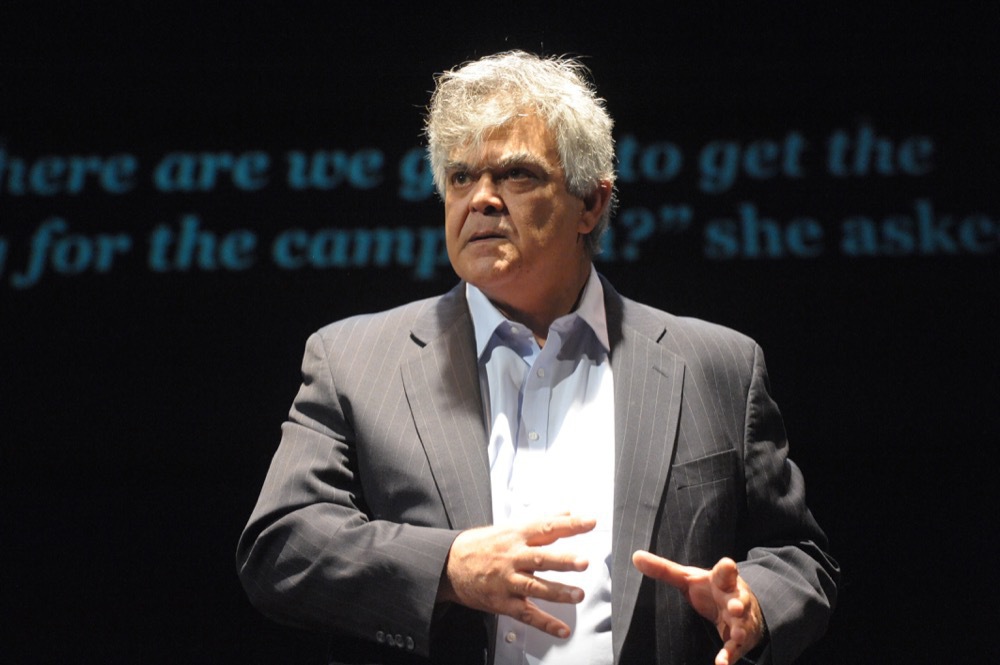Four theatrical performances highlighting multiple perspectives of the Israel/Palestine conflict brought approximately 400 viewers — and one Washington Post theater critic— to Eastern Mennonite University (EMU) in late February.
EMU was the last stop on Mosaic Theater Company of D.C.’s Voices from a Changing Middle East tour, which also included University of Oklahoma, Grinnell College and University of Chicago.
The tour, which featured performances of Izzeldin Abuelaish’s “I Shall Not Hate” and Sir David Hare’s “Via Dolorosa,” was the first for the three-year-old Washington D.C.-based theater company, which features “transformational, socially relevant art” with opportunities for audience engagement with the art and artists through talkbacks and discussions.
At EMU, the weekend performances were hosted by the Center for Justice and Peacebuilding and the theater department.
“It was an honor for EMU to host the award-winning Mosaic Theater Company of D.C.,” said CJP Executive Director Daryl Byler. “Their two riveting plays and the talkbacks that followed are poignant examples of how the arts have the potential to open space for conversation on difficult issues. The new generation of CJP students frequently reminds us that peacebuilding is enriched by its growing collaboration with the arts.”
Scholarship funds grow
Admission to the weekend’s performances was free, thanks to a generous donation from underwriters and longtime CJP donors James and Marian Payne, who also seeded a scholarship fund for a female Middle East student to embark on graduate studies in conflict transformation at EMU.
More than $40,300 has been raised, including donations from the weekend’s performances, towards the estimated cost of $43,200 to cover two years of study (this total includes tuition, travel, living expense and health insurance).
The scholarship is the result of a partnership with the Daughters for Life Foundation, an educational nonprofit founded by Dr. Izzeldin Abuelaish to commemorate the lives of his three daughters and a niece who were killed by Israeli bombs in their home in Gaza. It was through Abuelaish that EMU’s connection with Mosaic Theater was made. In 2014, the doctor visited EMU to speak about his memoir “I Shall Not Hate,” which was subsequently adapted into a play.
In fall 2017, CJP partnered with Abuelaish’s foundation to host an awards benefit fundraiser in Washington D.C. The inclusion of EMU on the Mosaic Theater’s national tour followed.
‘Voices’ festival brings multiple perspectives
One goal of the national tour was to “broaden the conversation” in the United States about the conflict, said the Mosaic Theater’s artistic director and founder Ari Roth in one of his welcoming addresses to the audience over the weekend. “Publicizing multiple perspectives to engage many … that is one purpose of these performances and discussions, to create potential for activism, to pressure and involve and work on not just one side, but all sides. How can we show the Israeli side and the Palestinian side?”
At EMU, the conversation is real and ongoing. CJP offers peacebuilding skills and training through graduate studies and professional development to peacebuilders from the region, while the university has sponsored Middle East cross-cultural semesters for undergraduates since 1984.
Washington Post critic Peter Marks led his coverage of the tour, published Feb. 23, with post-performance reactions from two EMU students who spent their 2017 spring semester traveling through the Middle East.
Along with students who had travelled in the region, CJP students and EMU community members, the audiences also included many former residents of the Israel/Palestine region.
Hope over hate
In one talkback session, a woman tearfully remembered hiding from the bombing in her father’s basement during the 1967 Six-Day War.
“Thousands of people should see this,” she said. “Where are the people?”
Another refugee, of a similar generation, said, “I was of the belief that time will solve our problem and my parents died with that hope. I am 82 years old and I will die without seeing a solution to the problem. It has to do with the attitude of both sides.”
After watching the character of Abuelaish choose hope over hate, graduate student and talkback facilitator Samira Abou Alfa, a Fulbright scholar from Lebanon, observed that the artwork, as an example of cross-cultural relationships, evoked within her a hope for transformation and cooperation.
“Just the fact that this story can be heard,” she said. “I am hopeful that this piece of art made it out of Palestine to here in the United States, which I consider one of the main actors in the region, so that people can learn more.”
Learn more
- UPDATE: Ari Roth reflects on the university/college tour in the March 22, 2018, Fairfax Times.
- At EMU, cross-cultural studies are a curricular focus for both undergraduate and graduate students. Visit the EMU cross-cultural program website. View a timeline of the university’s cross-cultural program.
- Read an op-ed about the U.S. embassy move to Jerusalem from longtime cross-cultural leader Dr. Linford Stutzman.
- James and Marian Payne were founding donors of the Center for Justice and Peacebuilding. Marian died in August 2017. amd James in January 2018. EMU will host a memorial service in May.
